Hey Poodle Parents! This article will completely deal with Your Poodle’s Dental Health. Let’s talk about a crucial yet often overlooked aspect of our beloved Poodles’ health—those adorable pearly whites!
Dental care for Poodles is more than just brushing; it’s a crucial part of their overall well-being. I’m here to guide you through everything you need to know to ensure your Poodle’s dental health is top-notch.
Understanding Your Poodle’s Dental Structure
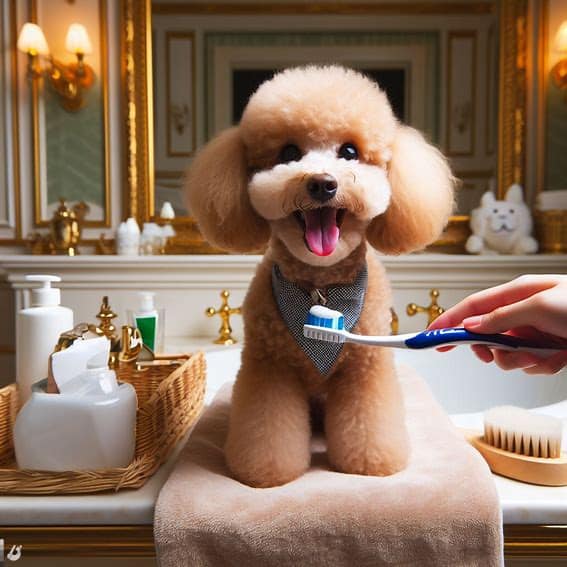
Understanding the dental anatomy of Poodles is like unlocking a door to their overall well-being. In their adulthood, Poodles have a dental structure consisting of 10 molars, 16 premolars, 12 incisors, and four canines.
Now, these aren’t just numbers; they are the foundation of your furry friend’s eating habits and, more importantly, their oral health.
In a poodle’s mouth, the 10 molars, which are flat and wide, help grind and crush food, making it easier to digest.
The 16 premolars, located behind the canines, also assist in chewing and tearing food.
The 12 incisors at the front of the mouth are used for biting and cutting, allowing the poodle to grasp and hold onto food.
Finally, the four canines, or pointed teeth, aid in tearing and holding onto larger pieces of food.
Together, these teeth perform different functions that contribute to the poodle’s ability to chew, tear, and process its food effectively for proper digestion.
The Consequences of Dental Issues

Poodles, with their charming personalities and elegant appearance, are unfortunately predisposed to various dental issues that extend far beyond causing mere bad breath.
These problems might seem localized to the mouth, but their ramifications can extend throughout the body, impacting vital organs like the kidneys and even shortening the lifespan of our beloved furry friends.
The accumulation of plaque and tartar not only affects their teeth and gums but also becomes a breeding ground for harmful bacteria. These bacteria can travel through the bloodstream, affecting the kidneys and possibly leading to more severe health complications.
Therefore, what might seem like a routine task of brushing their teeth is, in fact, a critical practice that actively prevents these potentially life-altering problems.
Regular dental care becomes a shield against a range of health issues that could otherwise impact your Poodle’s well-being.
Your Poodle’s Dental Health
Essential Dental Care Practices for Poodles

Maintaining a consistent routine of brushing your Poodle’s teeth is more than just a chore; it’s a crucial cornerstone in safeguarding their dental health. This practice isn’t merely about maintaining a dazzling smile (though that’s a plus!), it’s about preventing the dreaded plaque buildup and the onset of gum disease that can plague our furry friends.
But it’s not a one-trick show! While brushing is the star player in this oral hygiene team, it’s often recommended to complement this routine with dental treats and an effective dental spray. These additional tools work synergistically to bolster your Poodle’s oral health, ensuring that they remain free from dental troubles down the line.
The brushing action dislodges and removes the accumulation of plaque, while dental treats provide a bit of fun along with dental care, and the dental spray serves as a proactive measure, reaching areas where the toothbrush might miss, effectively maintaining their oral hygiene.
Together, this trio forms a comprehensive approach to keep your Poodle’s smile sparkling and their dental issues at bay.
Recognizing Signs of Dental Trouble
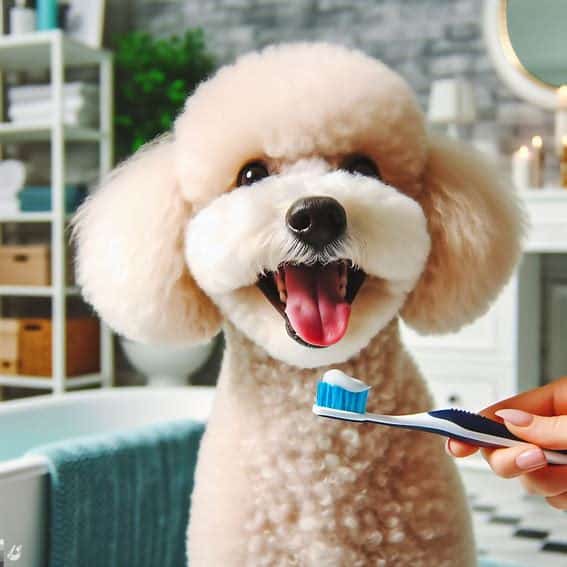
Paying close attention to your Poodle’s oral health can make a huge difference in catching dental issues early.
Look out for telltale signs such as gums that appear red, swollen, or bleed easily.
Additionally, watch for any signs of discomfort while they eat, which could mean something is bothering them in their mouth.
Persistent bad breath, beyond the usual “doggy breath,” might signal dental problems brewing.
These signs of discomfort during meals, along with any reluctance to eat or drop food from their mouth, are cues that shouldn’t be ignored.
These subtle signs could be your Poodle’s way of telling you that their dental health needs immediate attention.
Dietary Considerations for Dental Health
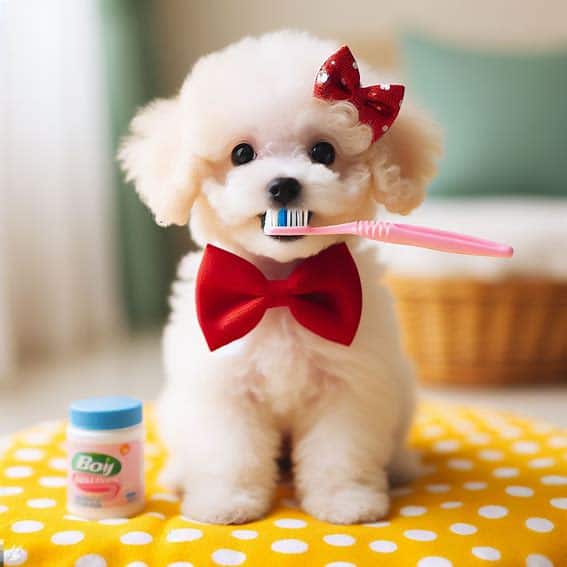
The dietary choices you make for your Poodle can significantly impact their dental health. Dry kibble, specifically designed to promote dental health in dogs, can be a fantastic choice.
The abrasive texture of dry kibble can act as a mild scrubber, aiding in scraping off plaque and tartar as your Poodle chews. This action helps prevent the buildup of these dental culprits, reducing the risk of gum disease and other oral health issues.
However, it’s important to note that while dry kibble can be beneficial, it’s not a substitute for regular brushing or professional dental care.
Smaller Poodles, especially Toy or Miniature Poodles, might be more prone to dental problems like receding gums. Their petite mouths can present challenges, making it important to pay extra attention to their diet.
Opt for specialized dental diets or smaller kibble sizes formulated for small breeds. These are often designed to encourage chewing and reduce the risk of dental issues common in smaller dogs.
These diets typically contain ingredients that support dental health, like specific enzymes or nutrients that promote oral hygiene.
Another beneficial addition to your Poodle’s diet can be providing bones for chewing.
Raw, meaty bones can serve as a natural dental aid for your Poodle. Chewing on bones can help remove plaque and tartar buildup from their teeth. However, it’s crucial to offer the right type of bones – raw bones that are appropriate for your Poodle’s size and temperament. Supervision during bone chewing sessions is essential to prevent any choking hazards or tooth fractures.
While bones can be beneficial, some caution is necessary. Cooked bones, particularly those from poultry, can splinter and cause serious harm to your Poodle’s digestive tract.
Always consult with your veterinarian before introducing bones into your Poodle’s diet. Additionally, for some dogs prone to digestive issues or aggressive chewers, safer alternatives like dental chews or toys specially designed to promote dental health might be a better option.
Remember, a balanced and nutritious diet is essential not only for your Poodle’s overall health but also for their dental well-being. Always consult with your vet or a canine nutritionist to tailor a diet that meets your Poodle’s specific needs and supports their dental health.
Regular Dental Care vs. Professional Intervention
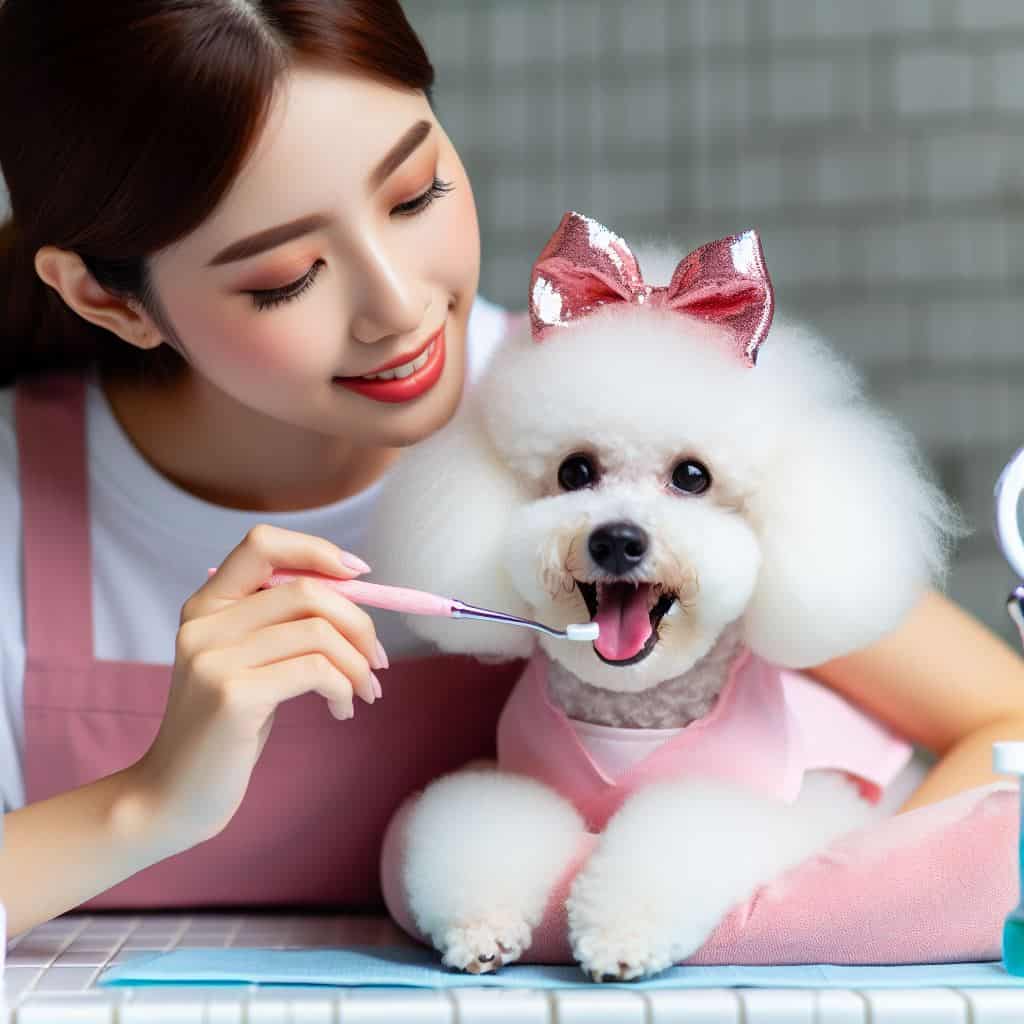
Preventing dental issues in your beloved Poodle starts with a simple yet essential practice: regular brushing sessions at home. This proactive approach is not just a suggestion but a critical step in maintaining your furry friend’s dental health.
It’s akin to the concept of “prevention is better than cure,” where the emphasis is on averting potential problems rather than dealing with them once they’ve escalated into emergencies.
When you commit to regular brushing sessions at home, you’re proactively addressing potential dental issues before they become severe. This practice isn’t just about convenience; it’s about ensuring your furry companion remains stress-free during grooming and dental care.
Waiting for a dental emergency can be both distressing for your pet and overwhelming for you as the owner.
In essence, regular brushing sessions serve as a cornerstone of your Poodle’s dental care regimen. They are the frontline defense against potential dental problems, ensuring your furry friend’s oral health remains in optimal condition.
So, rather than waiting for a dental issue to arise, embrace the proactive approach—establish a routine of regular brushing sessions, and watch as your Poodle’s bright smile and healthy teeth reflect the care and commitment you’ve invested in their well-being.
Professional Dental Check-ups: When Necessary
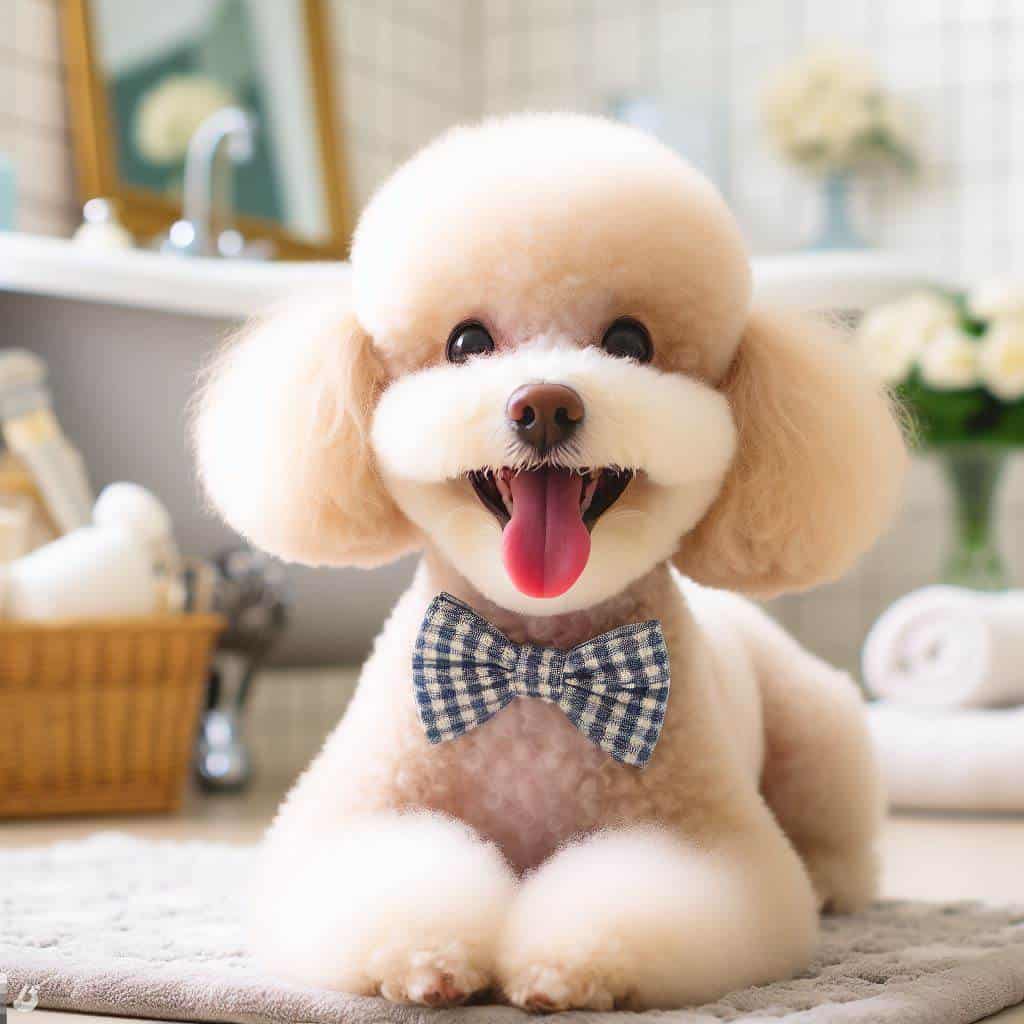
Periodic dental check-ups with a specialized veterinarian are a crucial aspect of comprehensive dental care for your Poodle. These professionals possess specialized knowledge and tools to delve deeper into your dog’s oral health.
One of the primary services they offer is deep cleaning, also known as dental prophylaxis. This procedure involves removing plaque and tartar buildup that regular brushing might not address. Using specialized tools, the vet carefully removes accumulated plaque from above and below the gum line, aiming to prevent gum disease and tooth decay.
Additionally, these veterinary experts can identify and address severe dental issues that might not be immediately evident to the pet owner.
From hidden infections to underlying dental diseases, their trained eye can catch problems that could otherwise escalate without intervention. Early detection is key in preventing these issues from worsening and affecting your Poodle’s overall health.
Moreover, these professionals offer valuable guidance on maintaining your Poodle’s oral health. They can provide personalized advice tailored to your dog’s specific needs, including recommendations for brushing techniques, suitable dental products, and dietary adjustments that can positively impact their dental well-being.
Getting Your Poodle Used To Brushing
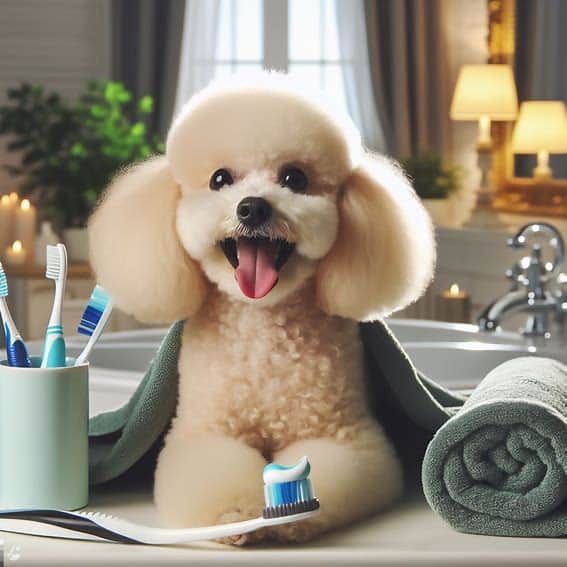
Introducing your Poodle to dental care at a young age sets the foundation for a lifetime of good oral hygiene. It’s crucial to approach this process with patience, understanding, and a gradual, positive reinforcement-based method.
Start by familiarizing your Poodle with the toothbrush without any pressure to brush immediately. Allow them to sniff and explore the toothbrush, making it a part of their playtime. This helps them associate the toothbrush with something non-threatening and positive.
Once your Poodle is comfortable with the toothbrush’s presence, begin by gently touching their gums and teeth with your finger. This step allows them to get accustomed to the sensation and touch inside their mouth. Use circular motions, similar to brushing, to simulate the brushing process lightly.
After the initial familiarization, introduce a small amount of dog toothpaste with a flavor they enjoy. Use your finger or a finger toothbrush to apply the toothpaste to their teeth. This step helps them associate the taste of the toothpaste with the brushing routine, making it more enticing.
Gradually transition to using an appropriate-sized dog toothbrush. Initially, use the toothbrush without toothpaste to allow them to get used to the feel of the bristles. Start with short, gentle brushing sessions, focusing on a few teeth at a time. Be gentle and calm, ensuring the experience is pleasant for your Poodle.
Throughout the process, reinforce positive behavior with praise, gentle words, and treats. Reward their cooperation and calm behavior during and after brushing sessions. Keep the atmosphere relaxed and make brushing time a bonding experience rather than a stressful chore.
Consistency is key! Establish a routine by incorporating brushing into their daily schedule. Aim for short, frequent brushing sessions initially, gradually increasing the duration as your Poodle becomes more comfortable. This consistent practice helps them adapt to the routine and reduces any anxiety associated with brushing.
If your Poodle shows signs of resistance or stress, avoid forcing the issue. Take a step back, try to make the experience more enjoyable, and slowly reintroduce the brushing routine. Always maintain a positive and patient attitude, as pushing too hard can create a negative association with dental care.
Creating a Calm and Comfortable Environment
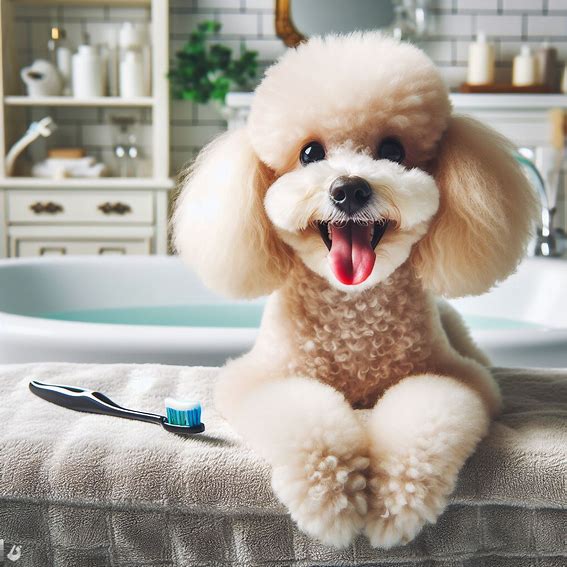
A serene environment during grooming, including dental care, is imperative for your Poodle’s comfort. Dogs are sensitive to stress, and a calm setting ensures they remain cooperative during brushing sessions. Dogs, including Poodles, are sensitive to stress, and a serene environment helps keep them comfortable and cooperative during grooming activities like brushing.
By providing a tranquil setting, you reduce the likelihood of your Poodle feeling anxious or stressed, making the brushing experience more pleasant for both you and your furry friend. This approach not only contributes to your Poodle’s well-being but also enhances their cooperation, making it easier to attend to their dental care needs without causing unnecessary discomfort or resistance.
Conclusion
In conclusion, your Poodle’s dental health is a crucial part of their overall wellness. Consistent dental care, coupled with a keen eye for signs of trouble and a well-balanced diet, is essential. By taking proactive steps to maintain their dental hygiene, you’re ensuring your furry friend has a healthy, happy smile for years to come.
Remember, your Poodle’s dental health is in your hands—let’s keep those smiles bright!
